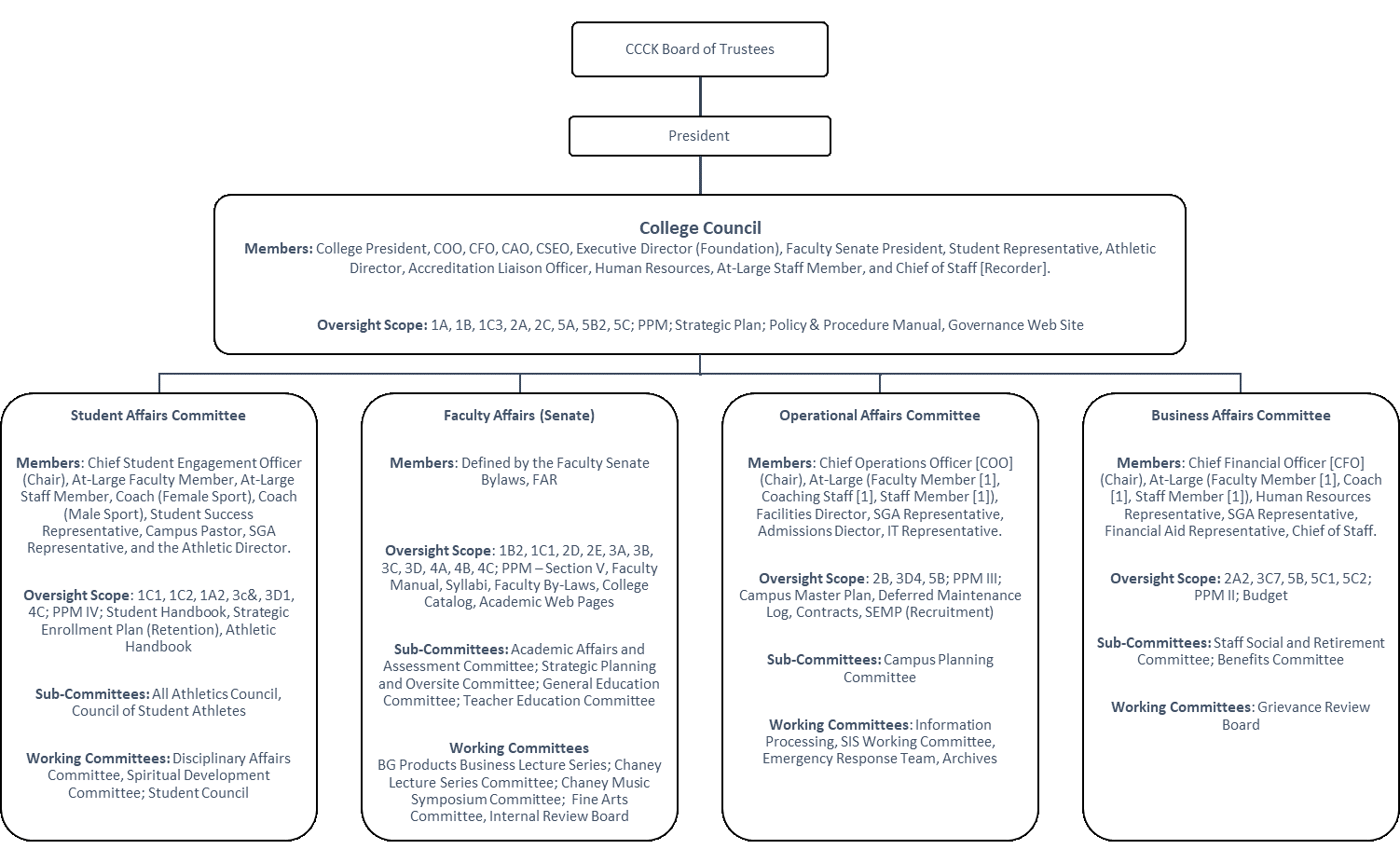Governance at CCCK
In its day-to-day operations, Central Christian College of Kansas relies on a system of shared governance, which seeks to maintain an environment that promotes participation and partnership, with an intentional desire to encourage “facilitative” responses, over “directives”. This is in accordance with the Criteria for Accreditation, as highlighted below:
- 2.C.5. The governing board delegates day-to-day management of the institution to the institutions’ administration and expects the institution’s faculty to oversee academic matters.
- 5.A.1. Shared governance at the institution engages its internal constituencies—including its governing board, administration, faculty, staff and students—through planning, policies, and procedures.
- 5.A.3. The institution’s administration ensures that faculty and, when appropriate, staff and students are involved in setting academic requirements, policy and processes through effective collaborative structures.
- 5.B.3. The planning processes encompasses the institution as a whole and considers the perspectives of internal and external constituent groups.
The following are guiding principles that help define how shared governance is operationalized:
- The College will responsibly and responsively maintain systems (e.g. committees, structures, and channels) that garner appropriate diverse perspectives concerning institutional processes and decisions.
- The College and members of its constituency will communicate openly and with transparency by welcoming an exchange of ideas without risk of reprisal.
- The College will seek to foster a culture of collaboration, engagement, and collective investment in the mission of the College.
The primary purpose of the governance system used by the College is designed to provide an organized forum for stakeholder groups to remain informed about and involved in the work of the College, with a specific focus on maintaining avenues allowing individuals and groups to inform and influence the decision-making process.
The governance process recognizes that not all constituents will be engaged in every institutional decision. However, the structure provides for a diversity of opinion, which is essential to a culture of inclusion and accountability. Therefore, and according to the guidelines set forth herein, each Governance Committee is empowered to pursue applicable business, ultimately resulting in a decision, recommendation, and/or referral, which are in turn submitted to the College Council.
To aid the College in its ongoing assessment and in its responsibility to the Higher Learning Commission, each governance body is apportioned sub-components of the Criteria for Accreditation. Each Governance Committee is charged to evaluate, address, and report on these sub-components as part of the ongoing work of the Assurance Argument. In addition, each Governance Committee is charged with the guardianship of key documents.
The menu to the left provides access to other governance-related resources.
Governance Structure
The Governance Structure illustrated below provides a graphic representation of how the different committees and constituent groups of the College interact, concerning governance-related issues. The College also maintains an Organizational Chart in the Policies and Procedures Manual, which represents the operational structure. This figure is designed to purely represent the flow of governance and highlight the oversight responsibility for each group.

Committee Descriptions
The following descriptions characterize the intended design and scope of each aspect of the governance structure, as they were defined at the beginning of the 2021-2022 academic year. As governance is an organic aspect of the College, some aspects of these descriptions may have evolved as the needs of the College and the shared input of the College community have shaped its development.
Committees play a vital role in the College’s governance process. Through representational membership, committees help ensure that deliberations and decisions benefit from diverse input, reflecting the thoughts, ideas, and opinions of the campus community. It is the role of committees to assist in the work of the College. Each committee is empowered to act within the scope of its authority. Some committees are advisory in nature and are primarily employed to provide counsel or serve as a means through which specific issues or appeals may be addressed. The College Council and each Affairs Committee include members from each constituent group of the college community in order to ensure equitable participation in the governance process. This also includes the authority to establish other sub-committees or work-groups in order to investigate an issue or item further, or to facilitate an enhanced manner through which to address items of concern.
Membership on the standing committees includes a mix of ex-offico, elected, and appointed members. Appointments are determined as follows:
- Ex Offico – By the nature of the office held
- Administrative – By the President
- Faculty – As determined by the Faculty Senate
- Staff – Administrated by the Chief of Staff, based on a process including volunteer, nomination/request, and appointment.
- Coach – As determined by the Coaching Staff
- Student – As determined by the Student Government Association
Committees are responsible to meet regularly and maintain a permanent record of all minutes.
College Council
The College Council is the plenary governance body of the College, vested with the responsibility to facilitate and promote the collective interests of the campus community. It is established to provide a structure for the internal stakeholders of the College to fulfill their responsibilities in the governance of the College. As such, the College Council operates in harmony with the College Governance structure, as well as the governance structure of the Board of Trustees and the Faculty Senate.
The College Council has the general power and responsibility to advise the President on college-wide policy and procedure recommendations and decisions, guarding and preserving the participatory decision-making processes. Any decision affecting other segments of the College or any current policy, procedure, or practice must be submitted to the College Council for consideration.
The College Council, in concurrence with the President, is given the responsibility and power to propose and adopt policies, regulations, and procedures in accordance with the missional and strategic objectives of the College. Actions of the College Council, in concurrence with the College President, become immediately effective, unless approval or affirmation is otherwise assigned to a specific entity as defined by the Governance Manual of the College or by the Board of Trustees.
Meetings, in general, are open to all who are interested in attending, unless the nature of the business justifies a closed executive session.
Oversight Scope: 1A, 1B, 1C3, 2A, 2C, 5A, 5B2, 5C; PPM; Strategic Plan; Policy & Procedure Manual, Governance Web Site
Members: College President, COO, CFO, CAO, CSEO, Executive Director (Foundation), Faculty Senate President, Student Representative, Athletic Director, Institutional Effectiveness Officer, At-Large Staff Member, and Chief of Staff [Recorder].
Faculty Senate (Faculty Affairs)
The Faculty Senate facilitates faculty involvement in institutional mission, governance, and assessment. As such, the Faculty Senate is the organization of the whole faculty, vested with the responsibility to facilitate and promote faculty interests. It is established to provide a structure for faculty to fulfill their responsibilities in the governance system of the College.
Oversight Scope: 1B2, 1C1, 2D, 2E, 3A, 3B, 3C, 3D, 4A, 4B, 4C; Faculty Manual, Syllabi, Faculty By-Laws
Members: Faculty Senate President, Faculty Senate Vice President, Faculty, Chief Academic Officer, Registrar, and Library-Success Center Director.
Student Affairs
Student Affairs provides oversight of policies and procedures related to the campus life ecosystem, including campus life, athletics, spiritual life, residential life, and student leadership, with specific concern for spiritual formation, student success, retention, persistence, and matriculation. Reviews progress of students and develops a plan of action for student success. Collaborates with the Council of Coaches to review policy and makes recommendations related to student-athlete success.
Oversight Scope: Criteria: 1C1, 1C2, 3C7, 3D, 4C; Policy Section, Student Handbook, SEMP (Retention), Athletic Handbook
Members: Chief Student Engagement Officer (Chair), At-Large Faculty Member, At-Large Staff Member, Coach (Female Sport), Coach (Male Sport), Student Success Representative, Campus Pastor, and the Athletic Director.
Operational Affairs
Operational Affairs is tasked with the optimization of campus infrastructure in response to the Mission, Strategic Plan, and curricular/co-curricular needs of the College including campus safety, communication systems, LMS, SIS, CRM, Information Security, and other structures, substructures, technologies, and protections needed to function as an institution of higher learning. Operational Affairs also provides support for outreach efforts including, pre-enrollment initiatives, recruitment, admissions, and marketing.
Oversight Scope: Criteria: 2B, 3D4, 5B; Policy Section, Campus Master Plan
Members: Chief Operations Officer [COO] (Chair), At-Large (Faculty Member [1], Coaching Staff [1], Staff Member [1]), Facilities Director, Admissions & Marketing Director, IT Representative.
Business Affairs
Business Affairs provides fiscal and human resource oversight. Fiscally, the committee ensures that budget development and resource allocation remain consistent with agreed-upon institutional priorities and known resources. This includes monitoring fiscal management and advocating controls that enhance budget alignment, as well as reviewing and recommending modifications in tuition and aid. In addition, this committee address employee interests (i.e. benefits, morale, professional developments, benevolence oversight, personnel management, etc.).
Oversight Scope: Criteria: 2A2, 3C7, 5B, 5C1, 5C2; Policy Section, Budget
Members: Chief Financial Officer [CFO] (Chair), At-Large (Faculty Member [1], Coach [1], Staff Member [1]), Human Resources Representative, Financial Aid Representative, Chief of Staff.





